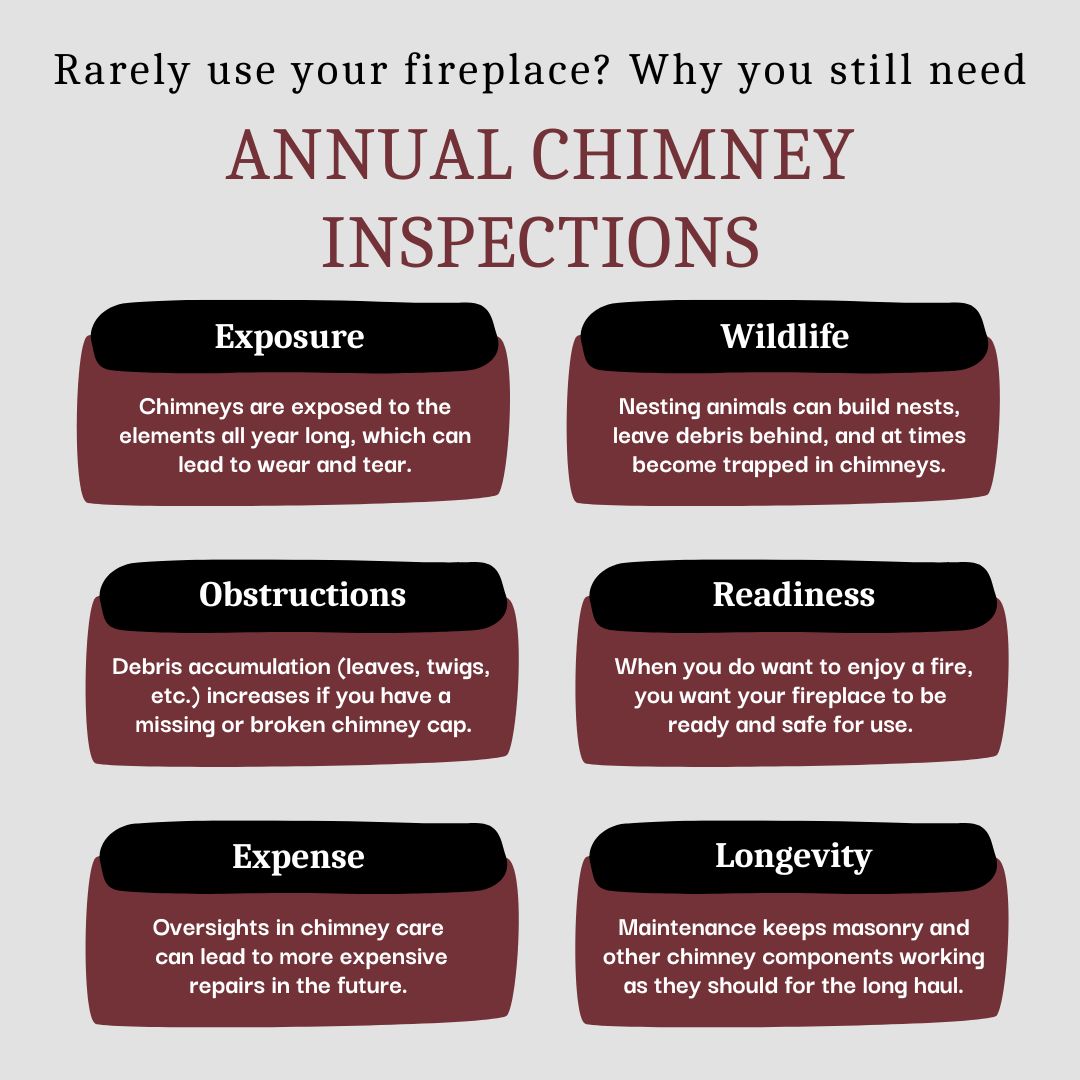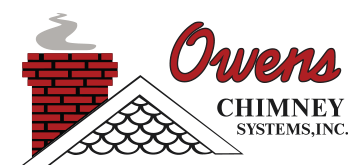When it comes to home maintenance, many homeowners focus on areas they use most often – and this means often overlooking the chimney. It might seem logical that if you don’t use your chimney often, you don’t need to have it inspected annually…but that logic is misleading. Chimneys, like any other part of your home, require attention and care, regardless of how much (or little) you use them.
To sum up: Yes – all fireplaces and chimneys, no matter the fuel type or how often they are used, need to be inspected every year.

Why Are Annual Chimney Inspections So Vital?
Exposure
A less often used chimney may have slower accumulation of soot or creosote to deal with – but there are still factors impacting the condition of your chimney.
Chimneys are exposed to the elements all year long, which can lead to wear and tear. Weather damage, such as spalling brick, cracked flue tiles, deteriorating mortar, or a damaged chimney cap can occur. Left unchecked, they will only become more extensive and problematic.
With regular inspections, we can detect these issues in a timely fashion, allowing for prompt repairs – and preventing the need for more significant (and expensive) restoration work down the line.
Wildlife
To you it’s a narrow, dark opening, but to a bird or small animal it might just look like the perfect spot for home sweet home. Nesting animals can build nests, leave debris, and at times even become trapped in chimneys.
Animals can cause damage to chimneys, and their nesting materials can obstruct ventilation. During an inspection, a professional technician can identify any signs of animal intrusion and help ensure that your chimney is clear and safe.
Other Obstructions
Animals aren’t the only offenders when it comes to blockages. Flue obstructions can consist of debris like twigs, leaves, soot, and creosote. The likelihood of debris accumulation increases if you have a missing or broken chimney cap, and creosote can accumulate quickly – especially if damp or green wood is burned – even with relatively low fireplace usage.
Readiness for Use
Some seasons of life just don’t seem as conducive to evenings at home in front of a fire. But when you do want to enjoy a fire, you want your fireplace to be ready and safe for use. Knowing your chimney has been inspected and maintained as recommended can give you a measure of assurance that your fireplace is good to go.
Since chimneys are what vent exhaust gases and smoke, problems like blockages or flue leaks can lead to harmful gases or particulates entering your living space. Foreign objects or substances can also pose fire hazards. Regular inspections help rule out these issues – or take steps to address them if they do exist.
Avoiding Costly Repairs
Oversights in chimney care can lead to more expensive repairs in the future. What might start out as a minor issue – a small crack or some minor creosote buildup, for example – can escalate into a major problem if not taken care of.
Some components of a chimney are difficult to access, and problems can be tricky to recognize and identify for the average homeowner. Regular inspections create space for early detection of problems. Often, this makes repairs more straightforward and less expensive. It may be a cliche, but it rings true: an ounce of prevention is worth a pound of cure.
Extending the Life of Your Chimney
Brick is notoriously a strong building material, and can last a very long time with proper care. Maintenance keeps masonry and other chimney components working together as they should and simply keeps your chimney in overall good condition.
On the other hand, deteriorating masonry can put your chimney structure at risk. And since your chimney system is integrated into your home, its well being is inextricably linked to that of your home in general.
Even if the rest of your home is in excellent shape, a compromised chimney can in turn compromise your home. That’s why investing in the health of your chimney goes far beyond aesthetics or the functionality of just your chimney. It’s an investment in the value of your home.
Be Proactive: Call Us Today
Chimneys should be inspected annually – or additionally in the case of a chimney fire, damage from lightning, or other concerning signs or events. If a property transaction is taking place, this also warrants a chimney inspection in addition to a home inspection. Also, homeowner’s insurance policies sometimes require routine chimney inspections by certified technicians in order to stay valid.
If you have concerns about your fireplace system, or if it’s been a while since your chimney was last inspected or swept, our team of certified professionals is ready to help. You can have confidence in the credentials and experience of our technicians, who will examine your system inside and out with attention to detail.
Questions? Reach out today to take steps toward greater efficiency, functionality, and enjoyment of your chimney system – whether you use it a little or a lot!
